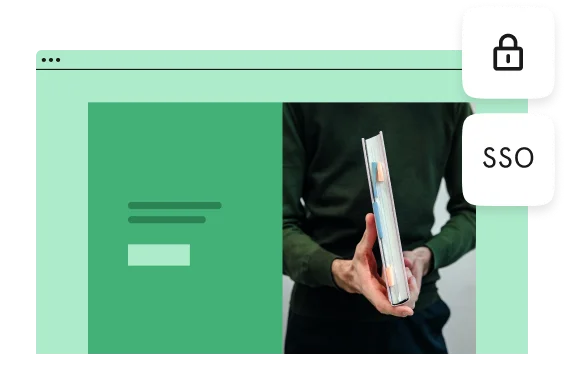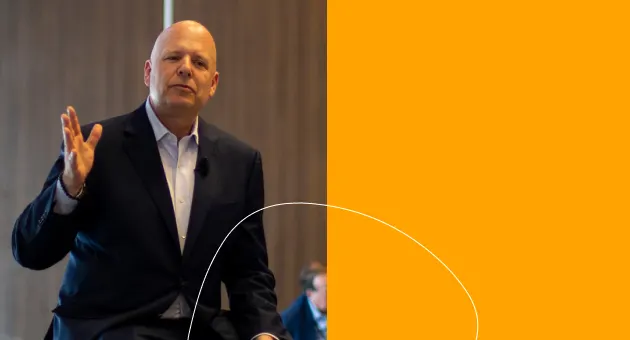Stale coffee, dry talks, forced networking. Not how you want people to remember your event.
But too often attendees sit through conferences checking messages and searching for the next distraction. Why? Because it’s more interesting than the bullet points the speaker’s reading off the screen.
Still, 84% of people feel that attending events is an important part of their job, and 79% go hoping to learn something. So why are over a third left disappointed with the events they attend?
It doesn’t have to be this way. Get your event marketing strategy right and you can educate customers, generate qualified leads, build brand awareness—and stop people from falling asleep.
Here’s how.
What is event marketing?
“Event marketing is when you host or attend an event—physical or virtual—to connect with your audience and promote your product, service, or brand.”
According to the Event Marketing 2018: Benchmarks and Trends report, 80% of marketers think that events are the single most effective marketing channel.
What’s the secret sauce of event marketing? Marketing-schools.org says:
“Event marketing engages consumers while they’re in a willing, participatory position.”
But the bigger picture is more complicated. Almost three-quarters of B2B professionals still find it difficult to work out ROI from their event spend—“elusive” is a word that comes up a lot.
So forking out for a booth at SXSW, giving away a few pens, and scanning some business cards is no guarantee of success.
You’re going to need a strategy. And a few key tactics.
Your event marketing strategy in 3 steps
“For some companies, attending events is solely about sales and ROI. Our main objective was awareness: sharing our brand and product message with key personas.”
Step 1: Know your why
Your objectives might be different than Typeform’s event strategy. But the starting point is the same: know your ‘why’ and define your goals. And be specific. “Drive more revenue” isn’t clear enough.
Make sure your objectives are connected with your other marketing priorities. Here are some great event goals:
The goals you choose will determine the type of event you organize. There’s no one-size-fits all approach, and you may have more than one objective.
For example, you may shell out for a conference booth to drive brand awareness. But you can also generate leads by asking people for their email address during a product demo.
If you go with multiple goals, make sure they’re clearly prioritized.
“Have one or two primary event objectives. Your event will be more focused, and you’ll stand a better chance of figuring out if it was worth the money.”
And look bigger than your event. Your main event goal may be to hand out a hundred pens, but it should be the start of a longer term relationship. This means knowing the goals of the people you interact with.
Step 2: Know your audience
Who are you trying to connect with? Whether you’re hosting the event, attending as a sponsor, or speaking as the keynote—keep your buyer persona in mind. Think about the type of event your target audience would like to attend.
Want to target young tech entrepreneurs or computer programmers? A casual Meetup with networking over beers will go farther than a hotel conference room with burnt coffee.
Step 3: Know yourself
How does your product help people? What does your brand stand for? Is your brand suave, sarcastic, or silly?
“An event should be a physical embodiment of your brand values.”
So know what you stand for, and align your event with this message.
Once you know the who and the why of your event, here’s how to get people to attend.
How to successfully market events
Have you ever seen the movie Field of Dreams? There’s that famous, whispering quote: “If you build it, he will come.”
Well, that won’t work for your event. You’ve got to get the word out.
Here’s a few ways to do it.
Make an amazing registration form
Ever been excited about signing up for an event, only for a tedious registration form to rain on your enthusiasm? Nothing says ‘fun’ like logistics and food allergies.
But for many people, their first interaction with your event will be via this form. So make sure it reflects the feeling and personality of your event if you want people to stay excited.
Customize the design, only ask questions that you have to, and make it clear what happens next after they hit ‘Submit.’
Here’s an example:
Get started with this event registration form today.
Use your email marketing list wisely
First, hit delete. It’s time to purge that massive contact list until it only includes relevant leads. Then let them know your event is coming up.
Don’t send out a mass email. If someone in Spain gets a message about your event in San Francisco, you think they’re going to show up? Probably not. Source: I get these all the time, and I rarely fly from Barcelona to the Bay.
Instead, segment and personalize.
Email list segmentation and individualized messaging were the most effective email marketing strategies in 2018. Deploy both if you want people to RSVP to your invitation.
Optimize for SEO
Eventbrite says that 10% of their ticket sales come from organic search. So you need to optimize your event for SEO to get your slice of that organic pie.
Google also introduced a new event search feature in 2017. It brings events on sites like Meetup, Ticketmaster, and Eventbrite to the top of search listings. Get your event on one of those, and you can piggyback off their domain authority to the first page of results.
There’s tons of advice out there on how to get your events to rank via search, and Google’s own guide is a pretty good place to start.
Create content
Video, press release, blog article, infographic, or social media post—whatever will attract your target audience in the places they’re likely to be browsing.
Talk about what makes your event unique, profile your guest speakers, or explain what industry challenges the event will solve. And of course, make it shareable.
If you manage to get Martha Stewart as guest speaker—like HubSpot did—then you better make sure people know about it. Even more so if she’ll be cooking on stage with Snoop Dogg.
Remember the reminders
Nobody wants to attend an event on their own—unless it’s something they’d rather keep to themselves, like a Justin Bieber fan convention. So once someone has signed up, make it easy for them to share the event with a friend.
And you want a full house when the day arrives, not just a full list of people saying they’ll be there. So send reminder emails as the event approaches, to make sure your event stays top of mind.
Socialize where your audience roams
If you’re serious about event advertising, you’ll need paid Facebook ads to get in front of the right people.
Here’s your guide to Facebook event photo sizes and specs.
Looking for organic reach? Get relevant influencers in on the act. Invite them to be speakers, or offer them a free ticket in return for supporting the event. If they’re a big player in your field, tapping their network for attendees can be a huge opportunity.
Got some social media gravitas of your own? Create a hashtag and get people to use it when posting about the event.
Brandwatch combined hashtags and paid social to get the word out about its NYK Conference.
And don’t forget your employees. Make sure they share the event with their networks too.
Next steps
Events may be fun, but they still have to pay off. Whether your goal is brand awareness or qualified leads, you have to know what success looks like.
This means getting the ‘marketing’ part of ‘event marketing’ sorted. And it also takes understanding your audience. Because that’s who you’re creating the event for.
Remember, the event isn’t your end goal. What matters are the relationships you build throughout the day.
Want more tips on building relationships with your customers? Check out our tips on relationship marketing.






